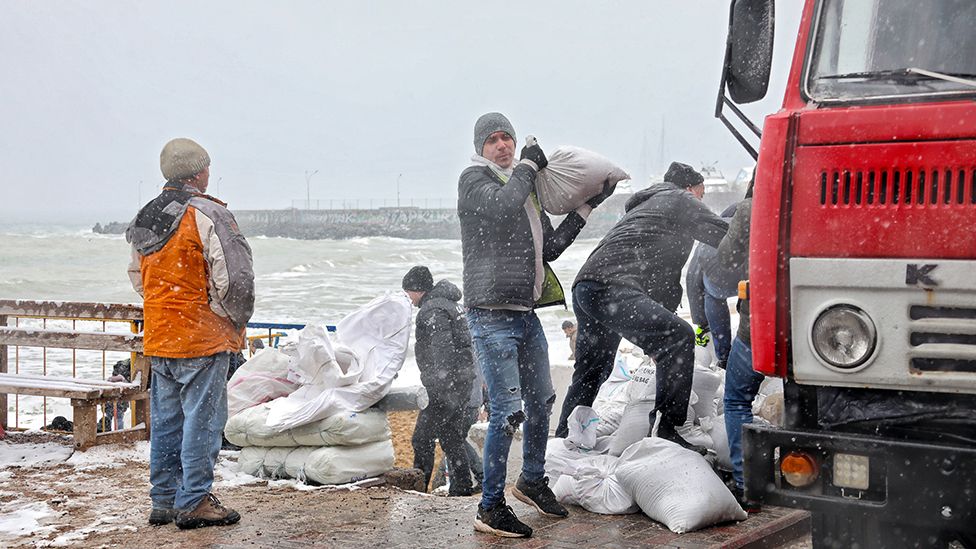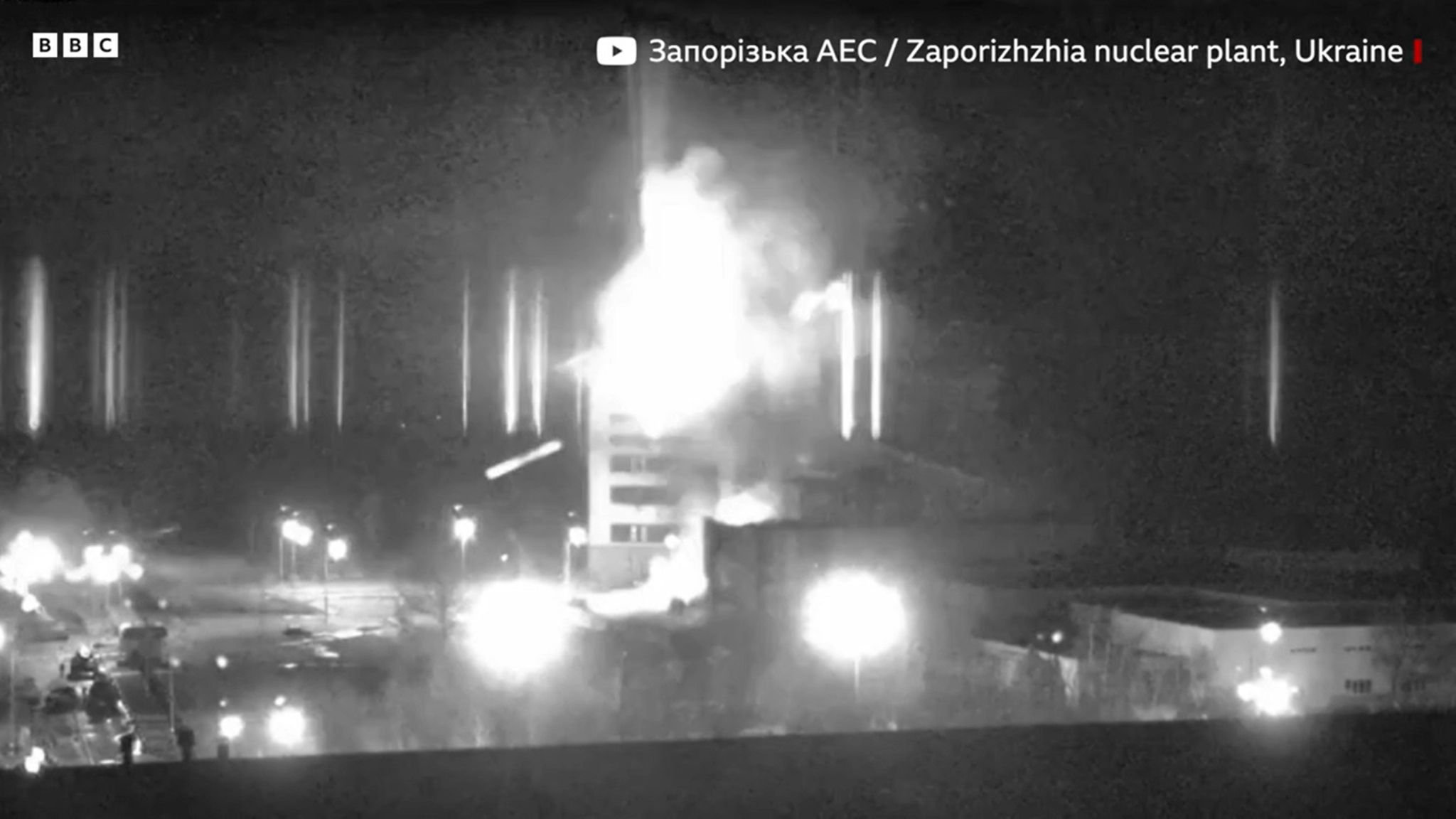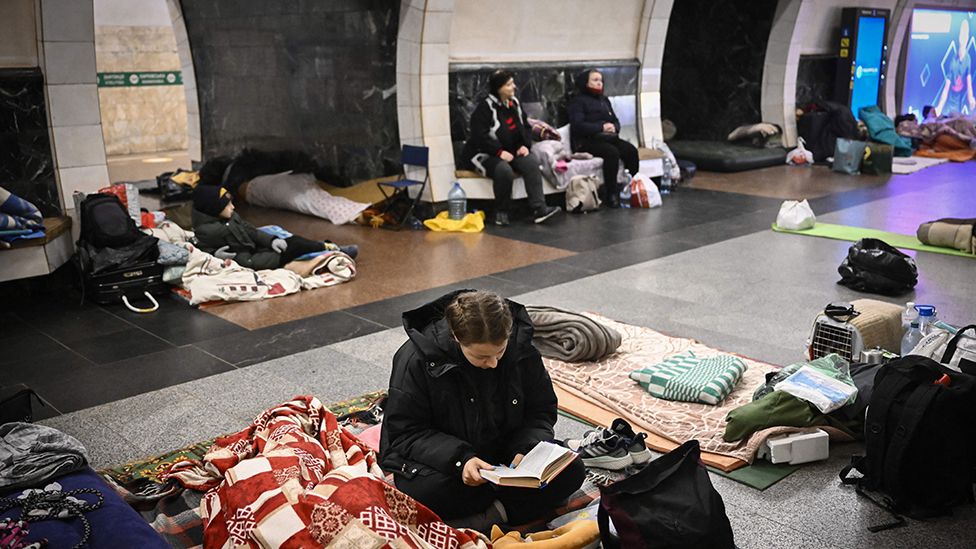BBC News 4 March 2022
It's more than a week since Russia began its invasion of Ukraine.
Residents of the capital Kyiv and several other cities are under bombardment from Russian missiles.
A nuclear power station also came under attack, causing an international outcry.
Readers of the BBC News website have been sending in questions about the situation. Some of them are answered here by:
The bigger picture - Frank Gardner
How is military aid getting into Ukraine? Why doesn't the Ukrainian air force attack the long Russian convoy? - David Finch
Ukraine's western border with Poland and other Nato countries is still not in Russian hands (the Russian invasion has come from the three other sides - north, south and east), so there is still a corridor for supplies to come in.
The Black Sea coast however is now largely under Russian control and deemed unsafe for most shipping.
Everyone is baffled as to why Ukraine has not done more to attack the Russian convoy as it is a sitting duck for drone and airstrikes.
There are several possible explanations, Ukraine may be running out of armed drones and its small, outnumbered air force may be wary of being shot down by Russian air defence batteries.
Ben Barry from the International Institute for Strategic Studies (IISS) suggests the Ukrainians may well be safeguarding what resources they do have in readiness to counter-attack when the Russians get closer to Kyiv.
What exactly will it take for Western powers to get involved here? - Rob Frank
The West has made it clear it will only get involved militarily if Russia attacks a Nato country. Ukraine is not in Nato but nearby countries Poland and the Baltic states are, hence Nato has been rushing reinforcements to bolster those countries' borders.
That said, western countries are supplying Ukraine with "defensive" equipment to help it try to repel the Russian invasion. This includes anti-aircraft and anti-tank missiles.
Some are calling for Nato to introduce a no-fly zone to stop Russian planes from carrying out airstrikes on Ukrainian cities. But Nato says it won't do that as it would entail shooting down Russian planes and that could lead to war with Russia.
So far I have heard nothing about prisoners of war. Are both sides taking any? - David Taylor
Yes. There are reports of Russian conscripts who have been taken prisoner and been given mobile phones to call home.
Their families, we are told, thought they were just being sent to the Donbas region on a small operation, or even an exercise, but certainly not a full-scale invasion.
Does Nato have any strategy for Russia attacking operational nuclear plants in Ukraine? - Barry Johnson
I don't think anyone even foresaw this, but beyond a lot of rhetoric condemning it as reckless and unacceptable, there's not a lot the West can do, short of military intervention. This has been ruled out, as there are full-scale battles raging across Ukraine.
On the other hand, it is not in Russia's interest to have a nuclear contamination disaster so close to its borders so the scenario of a nuclear plant being targeted may not be repeated.
The attack on the Zaporizhzhya nuclear power plant - Prof Claire Corkhill
How worried should we be?
The situation at the Zaporizhzhya power station is now under control and there has been no release of radioactive material. At the site, the reactors are being shut down, which puts them into a safe state.
The reactors themselves are well-shielded and resistant to fire or impact. More generally speaking, we should be concerned that nuclear facilities are military targets, because there are real risks of a nuclear accident.
How would it affect us here in the UK if something was to happen to the nuclear plant? - Victoria Udell
We are really too far away for there to be any hazard from radioactivity being released in the event of an accident.
If an accident were to occur, it wouldn't be quite like the one that occurred at Chernobyl in 1986. There, the graphite in the core caught fire and, because it burned for 10 days, the radioactive smoke was lifted high into the atmosphere and spread widely around Europe.
The reactors in Ukraine do not contain graphite, so are unlikely to catch fire or spread radioactivity widely.
What would really happen if a fire broke out or a bomb did get dropped directly at the plant or in the cooling units? - Maria
If there was a fire inside the reactor building, it would be instantly extinguished by the automatic safety systems. The reactor buildings themselves are fairly robust, so the nuclear fuel should be quite safe in there.
An explosion would only occur if there was a nuclear meltdown, which could be caused by the electricity supply to the site AND the back-up generators being damaged. If this happened to an operating nuclear power plant, then there could be an explosion like the one that happened Fukushima.
At Zaporizhzhya, the reactors are being put into a "shutdown", which means a nuclear meltdown could not happen.
The view from Kyiv - James Waterhouse
What's your life like right now as a reporter in Kyiv? Are there signs of normal life?
The day-to-day couldn't be more different from just over a week ago.
We often covered the politics of this crisis, maybe even filmed with people across Kyiv, a city we could freely move around in.
Now we are covering a full-scale war. Events are moving so quickly, and we find ourselves in and out of a bomb shelter like thousands of others.
The food we are having for now is still fresh - often Ukraine's signature borscht soup as well as ham and cheeses.
However, we are the extremely lucky ones. We've spoken to people now living in Metro stations where there is no running water or food being provided.
Above ground, the normal full pavements and busy nightlife have disappeared. Instead, there are blockades and military checkpoints.
Occasional friendly smiles have been replaced with nervous, wary looks. You can see the weight of tension on people's faces as they wait for what might be coming.
If Kyiv is eventually surrounded by Russian forces, would airdrops of supplies (food, ammunition) be possible, like the Berlin airlift? - Fred Williams
It's not clear yet what would happen if Kyiv was surrounded.
Negotiators from both Ukraine and Russia have agreed to create "humanitarian corridors" to let citizens escape the fighting.
It's possible Ukrainian forces could use these temporary ceasefires to resupply, as it was agreed food and water could be delivered to cities where there's been the heaviest fighting.
For now, supermarkets and pharmacies can stay open in cities. Stock is more limited and there are long queues though.
The distant rumbling of shells exploding is becoming more continuous as well. You become quite sensitive to the smallest changes. Occasionally a crackle of gunfire will make you jump.
Russian troops are continuing to mostly advance from the west and north, and the worry is Kyiv will find itself under a form of military chokehold, as we've seen with other cities.



